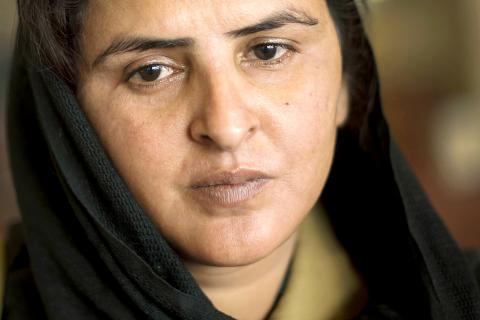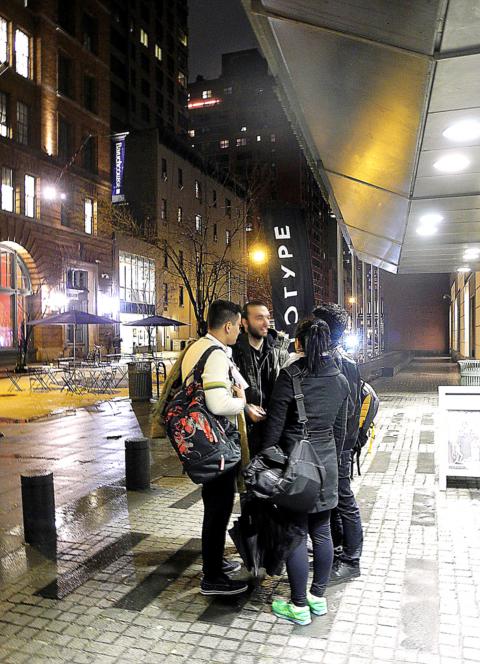To those who complain that opera is an elitist indulgence served up to snobs in dinner jackets, New York’s latest world premiere may come as something of a shock.
Inspired by the horrific gang rape of illiterate Pakistani woman Mukhtar Mai on orders of a village council, Thumbprint is a US$150,000 production currently having an eight-night run in a basement theater in Manhattan. One of the most infamous sex crimes against women in South Asia, Mai’s 2002 rape, survival and metamorphosis into an international rights icon is as far removed from opera-house pomp as possible.
It may have earned a less-than-glowing review from The New York Times — “muted,” “not quite enough” — but the score is an alluring blend of South Asian and Western music, and the production starkly innovative.

Photo: AFP
With a simple backcloth doubling up as a film projection screen, a few chairs and charpoys, the simple but powerful staging evokes the heat, the dust and the traditions of a Pakistani village.
Mai, now in her 40s, was raped to avenge her 12-year-old brother’s alleged impropriety with a woman from a rival clan.
Six men were sentenced to death for her rape in a landmark ruling. But five were later acquitted and the main culprit had his sentence reduced to life imprisonment: facts the opera omits.

Photo: AFP
Mai’s story has fresh resonance since the brutal gang rape of a student on a New Delhi bus and her death a little over a year ago sparked international outrage about the levels of violence against women in India.
“It’s inspiring,” said the opera’s Indian-American composer Kamala Sankaram, who also sings the lead role.
“This is a person who was completely illiterate and knew nothing of her rights and the laws of her country and yet she had the courage to step out,” she told AFP.
There is no staged recreation of the rape, which is instead portrayed by muffled shrieks of terror interspersed with a knife slashing open bags of sand.
Sankaram worked to recreate Mai’s world by combining Hindustani music, Western composition, qawwali and Bollywood.
“I am a sitar player as well as being a Western musician so I wanted to bring in elements of traditional culture but still keep it something acceptable to Western listeners,” she said.
Pakistan may be thousands of miles from New York but playwright and novelist Susan Yankowitz, who wrote the libretto, says the opera is about courage and universal vulnerability of women.
“The main question that is repeated throughout the opera is where did you find your courage... In a dry season, someone must be the first drop of rain,” Yankowitz told AFP.
“The courage is to be the first drop of rain and that’s what I hope people will take away from it and inspire people to take some action they would otherwise not have the courage to do.”
Compared to the majesty of New York’s Metropolitan Opera House a couple of miles up the road, Thumbprint is a tiny production with a six-person chamber orchestra and cast of just six singers.
Shown as part of a small chamber music opera festival in its second year, tickets cost just US$25 for the 90-minute production, which organizers hope will eventually tour India and Pakistan.
Unable to find a suitable sarangi player, Sankaram’s score has been written for flute, violin, viola, piano (with harmonium on the side) and a brilliant double bass and percussionist.
Most of the singers perform more than one part and the Baruch Performing Arts Center seats just 170 people.
The run ends Saturday, but it’s unclear what Mai makes of it all.
Since the attack, she has set up a school for girls and won prominence in the West for her outspoken stance on the oppression of women.
Manu Narayan, the Broadway star who has won rave reviews as an all-too-realistic unrepentant rapist, welcomed the opera and the Prototype opera festival as a vital platform for young composers.
Bankruptcy forced New York City Opera to close last year. Some artists and musicians complain that original culture in New York City is being priced out of the metropolis by big business.
“I think the music’s spectacular,” Narayan told AFP.
“This festival is so wonderful. It really creates a focused platform for new works and great stories that need to be told, and the story of Mukhtar Mai is one of the prime examples.”

Every now and then, it’s nice to just point somewhere on a map and head out with no plan. In Taiwan, where convenience reigns, food options are plentiful and people are generally friendly and helpful, this type of trip is that much easier to pull off. One day last November, a spur-of-the-moment day hike in the hills of Chiayi County turned into a surprisingly memorable experience that impressed on me once again how fortunate we all are to call this island home. The scenery I walked through that day — a mix of forest and farms reaching up into the clouds

With one week left until election day, the drama is high in the race for the Chinese Nationalist Party (KMT) chair. The race is still potentially wide open between the three frontrunners. The most accurate poll is done by Apollo Survey & Research Co (艾普羅民調公司), which was conducted a week and a half ago with two-thirds of the respondents party members, who are the only ones eligible to vote. For details on the candidates, check the Oct. 4 edition of this column, “A look at the KMT chair candidates” on page 12. The popular frontrunner was 56-year-old Cheng Li-wun (鄭麗文)

“How China Threatens to Force Taiwan Into a Total Blackout” screamed a Wall Street Journal (WSJ) headline last week, yet another of the endless clickbait examples of the energy threat via blockade that doesn’t exist. Since the headline is recycled, I will recycle the rebuttal: once industrial power demand collapses (there’s a blockade so trade is gone, remember?) “a handful of shops and factories could run for months on coal and renewables, as Ko Yun-ling (柯昀伶) and Chao Chia-wei (趙家緯) pointed out in a piece at Taiwan Insight earlier this year.” Sadly, the existence of these facts will not stop the

Oct. 13 to Oct. 19 When ordered to resign from her teaching position in June 1928 due to her husband’s anti-colonial activities, Lin Shih-hao (林氏好) refused to back down. The next day, she still showed up at Tainan Second Preschool, where she was warned that she would be fired if she didn’t comply. Lin continued to ignore the orders and was eventually let go without severance — even losing her pay for that month. Rather than despairing, she found a non-government job and even joined her husband Lu Ping-ting’s (盧丙丁) non-violent resistance and labor rights movements. When the government’s 1931 crackdown